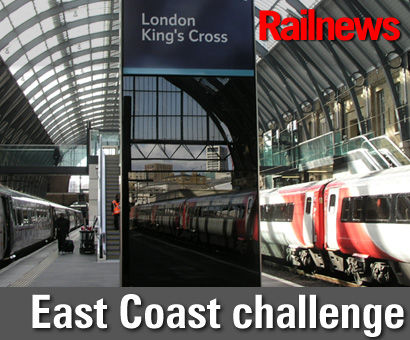VIRGIN TRAINS East Coast faces a new challenge from a defeated rival less than two weeks after the reprivatised franchise was launched.
The challenger is FirstGroup, which was one of the shortlisted contenders for the controversial contract.
Now the transport group has revealed that it has submitted a formal track access application to the Office of Rail Regulation, which involves 'several' open access trains a day between London and Edinburgh. There would be intermediate stops, but only at Stevenage, Newcastle and Morpeth.
First said it intends to compete with aviation, and does not mention the new East Coast intercity franchise, which was launched on 1 March. First explained: "The service is designed specifically to encourage travellers to switch from air to rail as currently two thirds of journeys between the two capitals are made by plane.
"Passengers would benefit from low fares, free Wi-Fi and onboard catering, all offered in one high-quality class of travel on brand new, state of the art rolling stock comparable to other trains being introduced on the route. If successful with the application it is planned that the new services will be introduced from 2018."
Although the official target is domestic airlines, FirstGroup's ambitions will also be potential competition for Virgin Trains East Coast, 90 per cent of which is owned by Stagecoach and the rest by Virgin Trains.
First added: "FirstGroup will introduce fares that are highly competitive with budget air carriers and persuade many passengers to and from London to make the greener switch to rail. Stevenage station in the South East is close to Luton and Stansted airports, and Morpeth station is close to Newcastle airport, and serving these stations will help potential air travellers consider rail as an option."
First already has the majority share of an East Coast open access operator, First Hull Trains, which launched a new daily return service to London from Beverley in North Yorkshire last month.
First chief executive Tim O'Toole added: "These innovative plans will give customers travelling between London, the North East of England and Edinburgh an attractive alternative to flying. We hope to entice passengers away from budget airlines through our low fares and high-quality trains. Open access operators can really add value and create passenger loyalty by serving niche markets. Our current company First Hull Trains remains an exceptional example of how passengers can benefit from this type of operation. We have put our compelling case to the ORR and we are looking forward to hearing the outcome of our application.”
Meanwhile, a spokesman for the Stagecoach/Virgin consortium warned that if a competing open access service was given key paths, taxpayers might become liable for any resulting revenue losses.
The spokesman explained: “Our bid took account of the potential for new open access operations. Indeed, FirstGroup’s proposals are a scaled down version of similar plans already published by another open access operator. The franchise agreement we have with the Department for Transport includes contractual protection for the majority of any revenue shortfall should we not secure the track access to deliver our own timetable.
“While limited open access competition is possible, we don’t believe what has been proposed would be compatible with our timetable proposals."
The Office of Rail Regulation will now consider the proposals with the aid of an industry consultation over the next few weeks.


